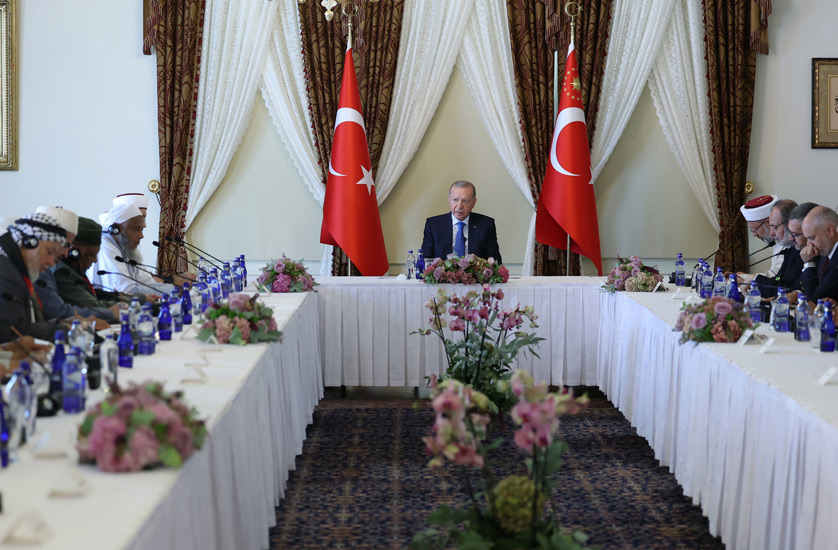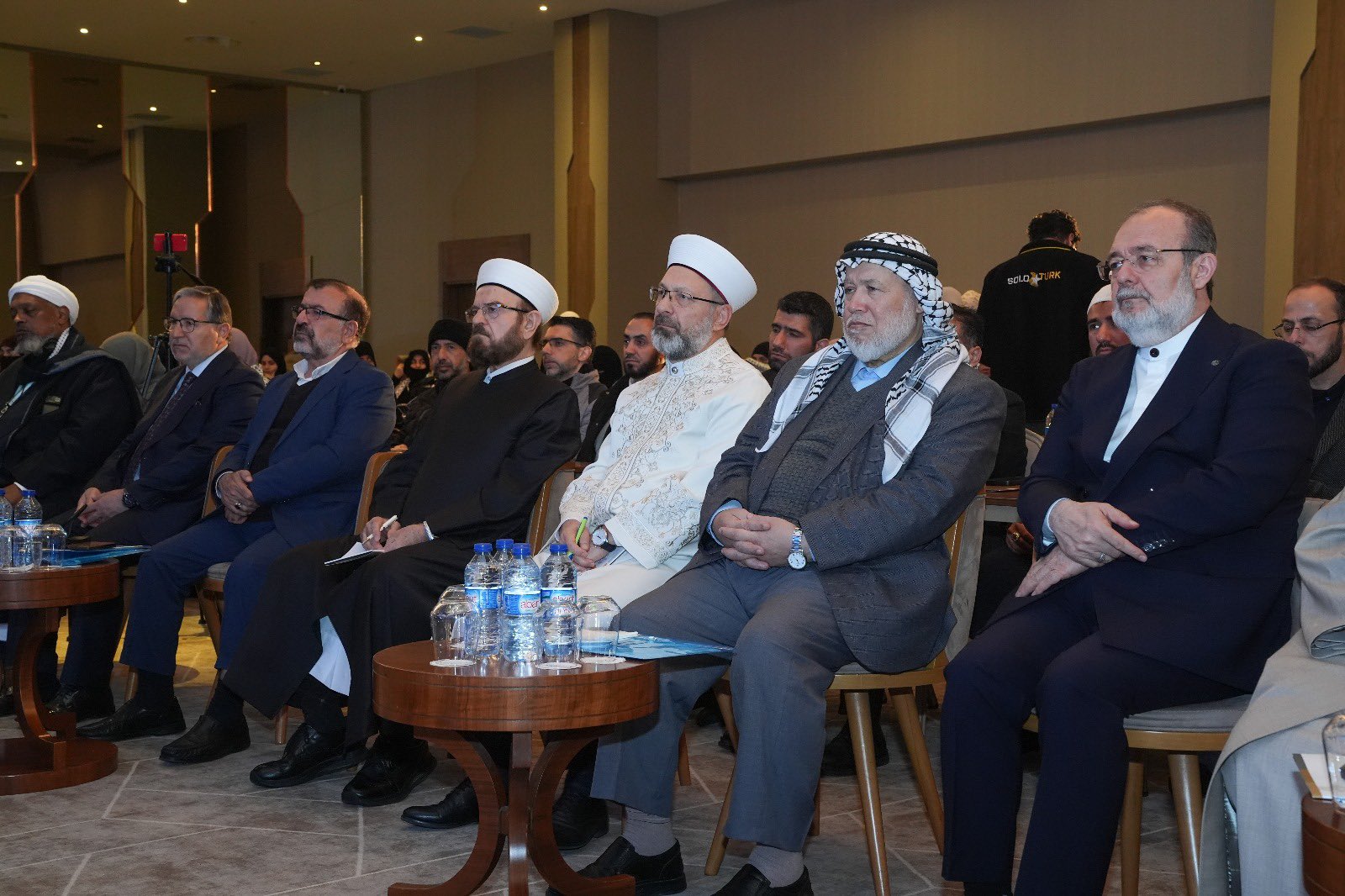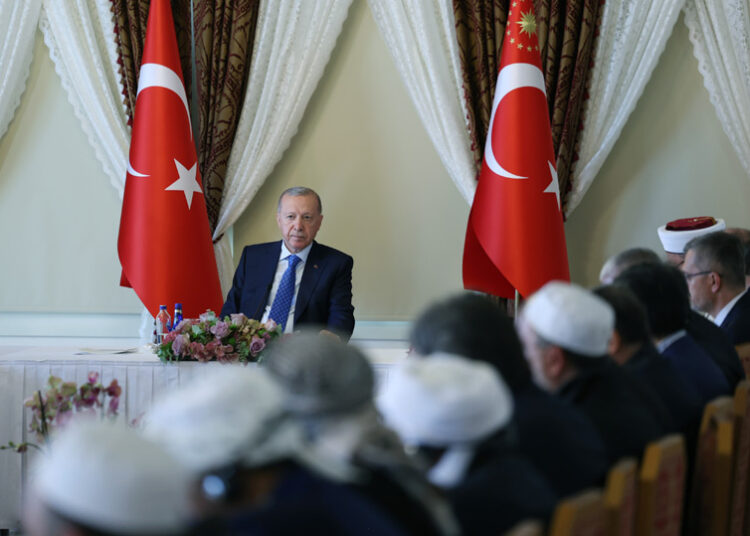Turkish President Recep Tayyip Erdogan continues to demonstrate his longstanding support for clerics linked to the Muslim Brotherhood despite ongoing efforts to improve relations with regional powers that have designated the group as a terrorist organization.
On August 28, 2025, Erdogan hosted the International Union of Muslim Scholars (IUMS) at the historic Hayreddin Pasha Mansion in Istanbul. The meeting was attended by Ali Erbaş, head of Turkey’s Directorate of Religious Affairs (Diyanet), and Mehmet Görmez, president of the International Islamic Thought Foundation and the Institute of Islamic Thought.
The IUMS delegation was in Turkey to participate in a conference on Gaza, co-organized with the state-supported Foundation of Islamic Scholars in Turkey. The event brought together 150 Islamic scholars from 50 countries and highlighted Ankara’s continued role as a gathering point for religious leaders who align themselves with Erdogan’s political positioning within the Islamic world.
The relationship between Erdogan and the IUMS is longstanding and deep and has been particularly visible during key political moments. One example came ahead of Turkey’s last presidential election in 2023 when the IUMS released a statement signed by 55 scholars from across the Islamic world calling on Muslims to support Erdogan at the ballot box, framing the election as a global Islamic duty. Citing Quranic verses, the scholars argued that Erdogan’s leadership had strengthened the rights and freedoms of Muslims in Turkey and beyond. The message emphasized his lifting of the ban on the Islamic headscarf, expansion of Quranic education and reintroduction of Islamic values into public life.
The statement further underscored Turkey’s rise as a regional power under Erdogan, pointing to achievements in health, defense and technology, including the development of drones and electric vehicles.
The endorsement was circulated widely among religious and political circles. Some analysts suggested the statement had been prepared with input from Erdogan’s office, though no official confirmation was given.

Despite significant pressure from regional rivals, Erdogan has not distanced himself from groups and individuals associated with the Muslim Brotherhood. On September 10, 2023, he welcomed a delegation at the presidential palace in Ankara led by Oussama Jammal, secretary-general of the US Council of Muslim Organizations (USCMO) and a prominent Brotherhood-linked figure in the United States.
During the meeting Erdogan underlined the importance of the global Muslim community, or Ummah, standing united against Islamophobia and intolerance. He also sought USCMO’s support against what he described as hostile lobbying activities in the United States. In addition, he voiced hope for stronger engagement with the Turkish diaspora in America.
These encounters illustrate Erdogan’s effort to maintain ties with Brotherhood-affiliated networks at a time when Egypt, the United Arab Emirates and Saudi Arabia continue to designate the movement as a terrorist organization. Ankara has simultaneously pursued normalization with these same countries, reopening trade channels and restoring diplomatic contacts after years of tension.
Erdogan’s engagement with Brotherhood-linked groups comes after a period of adjustment in Turkey’s regional strategy. Following years of hostility with Cairo, Ankara sought rapprochement by curbing the activities of exiled Muslim Brotherhood figures who had relocated to Istanbul after the ousting of Egyptian President Mohamed Morsi in 2013.
At Egypt’s request several Istanbul-based television channels run by Brotherhood affiliates were shut down or scaled back their operations. Some prominent Brotherhood leaders were also asked to leave Turkey, relocating to other countries in the region. These measures were interpreted as signs of Ankara’s willingness to repair relations with Cairo.
However, Erdogan has since balanced these concessions with symbolic and practical gestures of support toward Brotherhood-aligned scholars. Observers view his meetings with IUMS and other clerics as part of this balancing act, designed to preserve his standing among Islamist movements while maintaining newly restored ties with regional governments.

The IUMS, which maintains close cooperation with Erdogan and has ideological ties to the Muslim Brotherhood, attracted international attention earlier in 2025 when it issued a sweeping religious decree regarding the conflict in Gaza. On April 4 IUMS President Ali al-Qaradaghi, also known in Turkey as Ali Karadagi, declared that the situation in Gaza amounted to genocide. The organization’s fatwa called on Muslim nations to mobilize militarily and economically in defense of Palestinians.
Analysts note that Erdogan’s continued association with IUMS and similar networks coincides with his use of the Diyanet as a vehicle for outreach. The Directorate of Religious Affairs has played a central role in hosting delegations, organizing events and disseminating messages that align with Erdogan’s vision of Muslim solidarity.
By hosting high-profile gatherings of religious scholars, Erdogan reinforces his image as a leader of the global Muslim community. Such events serve both domestic and international audiences, allowing him to showcase his connections to influential clerics while maintaining diplomatic overtures to governments that view the Muslim Brotherhood with suspicion.
Erdogan’s dual approach underscores the complexity of Turkey’s current foreign policy. While seeking closer ties with Egypt, Saudi Arabia and the United Arab Emirates, Ankara continues to provide platforms for Brotherhood-linked scholars and institutions.
This strategy allows Erdogan to maintain his reputation among Islamist networks while avoiding a complete break with regional partners.












